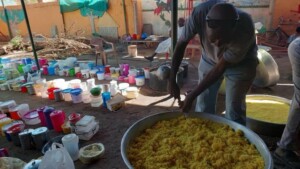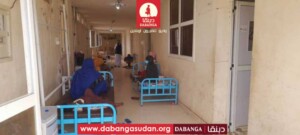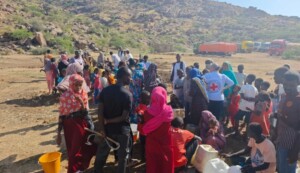Sudan cholera cases spread to Sennar state
Ten cases of cholera have been reported in Sennar since Friday, adjacent to Blue Nile state in which 72 cases were reported as of Sunday.
 Poster distributed in 2017 about how to prevent the spread of cholera in Sudan (Sudanese Doctors' Union)
Poster distributed in 2017 about how to prevent the spread of cholera in Sudan (Sudanese Doctors' Union)
Ten cases of cholera have been reported in eastern Sudan's Sennar since Friday, adjacent to Blue Nile state in which 72 cases were reported as of Sunday.
According to health workers, Singa Hospital in Sennar has recorded ten cases of cholera, making Sennar the second state in Sudan to be affected by cases of cholera. Health sources from Singa told Radio Dabanga that cases began to appear in Wad El Nil on Friday, two of which were referred to Singa hospital on Saturday.
According to the report of the State Doctors' Committee, El Roseires and Ed Damazin Hospital in Blue Nile state recorded six deaths until Sunday. 18 people there are still receiving treatment. In addition, the number of cases in health centres in Wad El Maha and El Serio in Blue Nile state is six, five of whom are still receiving treatment.
Official statements: ‘acute watery diarrhoea’
In a statement on September 11, the WHO confirmed that between August 28 and September 10, Sudan’s Federal Ministry of Health reported at least 51 cases of ‘acute watery diarrhoea’ in Blue Nile state. Samples taken from six patients and sent for analysis to the Ministry’s National Public Health Laboratory showed that four of the six samples tested positive for Vibrio cholerae.
“Due to suboptimal health conditions and poor safe water and sewage system structures, exacerbated by polluted water sources caused by recent floods, there is a risk of cholera and other diarrhoeal diseases spreading if no immediate response interventions take place,” said the WHO representative in Sudan.
On September 9, the Sudanese Ministry of Health confirmed four cases of cholera in Blue Nile state. Since 2017, the Sudanese government (and conniving international organisations) has consistently referred to cases suspected to be cholera as ‘acute watery diarrhoea’, in spite of solid pathological evidence (according WHO standards) of cholera. Sudan’s acknowledgement therefore represents something of a breakthrough.
Follow #CholeraInSudan, #ألكوليرا_السودان
Radio Dabanga’s editorial independence means that we can continue to provide factual updates about political developments to Sudanese and international actors, educate people about how to avoid outbreaks of infectious diseases, and provide a window to the world for those in all corners of Sudan. Support Radio Dabanga for as little as €2.50, the equivalent of a cup of coffee.










 and then
and then